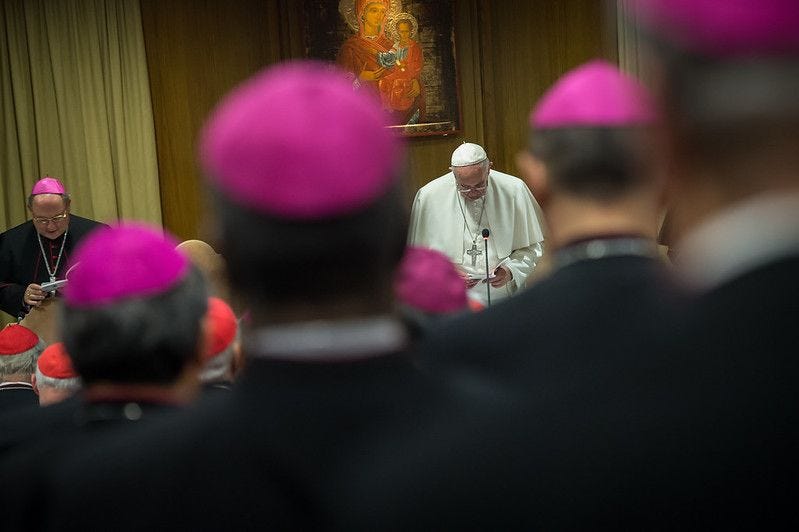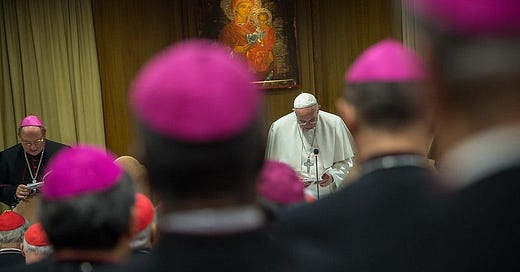
Vatican synodality text calls for structural reforms
The working document for the next phase of the synod on synodality calls for structural reforms

A working document for the continental phase of the Church’s global “synod on synodality” has called for institutional and structural reform of the Church at all levels, to better incorporate synodality into ecclesiastical life.
The text, issued Oct. 27 by the Vatican’s Permanent Secretariat of the Synod of Bishops, praised the local and national phases of the synodal process as a success, saying that “participation exceeded all expectations.”
“Millions of people all over the world have been involved in the Synod’s activities: some by participating in the meetings at the local level, some by collaborating in the animation and coordination of the activities at the different levels, and some by offering the support of their prayers,” the text explained.
While presenting what it called a representative synopsis of national reports submitted to Rome, the working document summarized themes addressed during the early stages of the synodal process, but said it did not offer an endorsement of specific viewpoints.
But the document did call for institutional changes at all levels of the Church, to better embody the synodal methodology.
The “ultimate purpose” of the synodal process, the working document explained, “is not to produce documents but to open horizons of hope for the fulfillment of the Church’s mission.”
To that end, the document recommended the reform of virtually all ecclesiastical structures.
“All Church institutions, as fully participatory bodies, are called to consider how they might integrate the call to synodality into the ways in which they exercise their functions and their mission, renewing their structures and procedures,” the text said.
“The Church also needs to give a synodal form and way of proceeding to its own institutions and structures, particularly with regard to governance. Canon law will need to accompany this process of structural renewal creating the necessary changes to the arrangements currently in place.”
The text mentioned as venues for new forms of synodal dialogue local institutions like pastoral and finance councils at the diocesan and parochial level, along with national episcopal conferences, and the dicasteries of the Roman curia.
But the working document also called for cultural change in the Church toward a prioritization of synodality, which is the process of a common and prayerful exchange of ideas, in order to discern the will of God.
“Structures alone are not enough: there is a need for ongoing formation to support a widespread synodal culture,” the text said, noting that “the need for more specific formation in listening and dialogue” was called for by several national reports, along with “the establishment of synodality agents and teams.”
📰
The working document was published to help diocesan bishops and national episcopal conferences engage in a continental phase of the synodal process, which is scheduled to begin in North America with virtual sessions in December.
The text was drafted by a working group composed of bishops, priests, consecrated men and women, and laity with “a very diverse disciplinary expertise,” according to the secretariat.
The group considered submissions from 112 episcopal conferences, 15 Eastern Catholic Churches, several curial dicasteries, and numerous religious orders. The working document said the group had also considered more than 1,000 individual submissions sent to the secretariat directly.
The working group met for two weeks at the end of September, together with the document’s drafting team, lead by Cardinal Mario Grech, the head of the synodal secretariat, and Cardinal Jean-Claude Hollerich of Luxembourg, the relator general for the synodal assembly in Rome next year.
Retweets =/= endorsements
While calling for a new synodal approach at all levels of ecclesiastical life, the working document also presented excerpts from reports submitted by national episcopal conferences, noting the presence of common themes and topics of discussion across different regions.
But the working document said that while many of the same issues were discussed in different places, there was not usually consensus about how to address them — even on issues seemingly resolved by authoritative doctrinal pronouncements.
The working text also recognized that the synodal process did not produce consensus on many issues, even those already definitively decided upon by the Church.
In presenting the “tensions” highlighted by the synodal process so far, the continental document did not affirm or deny, or even acknowledge the Church’s teaching on disputed issues, instead it simply presented the range of views expressed.
“Many reports ask that the Church continue its discernment in relation to a range of specific questions,” the document said, specifically noting that a “diversity of opinion was expressed on the subject of priestly ordination for women, which some reports call for, while others consider [it] a closed issue.”
The text said that the inclusion of excerpts from national reports was “not to be interpreted as endorsing the positions of any particular area of the globe,” but only to illustrate the “experience” of those who have participated in the synodal process thus far.
Several excerpts from national reports called for radical, sometimes controversial, changes to Catholic doctrine, discipline, and ecclesiology.
“It is important to build a synodal institutional model as an ecclesial paradigm of deconstructing pyramidal power that privileges unipersonal managements,” said an excerpt from the the Argentine bishops’ conference report, which appeared to question the hierarchical constitution of the Church, articulated by Vatican Council II’s dogmatic constitution Lumen gentium as instituted by Christ.
A 'welcoming space'
The working document also noted several calls for the Church to adopt a “more meaningful dialogue” with and “more welcoming space for” particular groups who said they feel unwelcome in the Church.
Among those groups, the report said, are people who feel “a tension between belonging to the Church and their own loving relationships, such as: remarried divorcees, single parents, people living in a polygamous marriage, LGBTQ people, etc.”
The text also flagged the concerns of “those who left ordained ministry and married, too, ask for a more welcoming Church, with greater willingness to dialogue.”
It added that episcopal conference reports also “give voice to the pain of not being able to access the Sacraments experienced by remarried divorcees and those who have entered into polygamous marriages,” and that “there is no unanimity on how to deal with these situations.”
Start your day with Starting Seven - a daily news roundup in your inbox.
'Pentecost' not 'Babel'
While at times acknowledging ecclesial division over the synodal process, the working document said that a key aspect of creating a “synodal” Church is “responding to diversity and the tensions it generates,” so as to avoid creating the “experience of Babel and not Pentecost.”
Such a response, the working document said, requires that synodality be anchored in prayer and mutual discernment in the Holy Spirit, without allowing the process to devolve into a democratic exercise.
The text emphasized the “deep link between synodality and liturgy” and pointed out that “the Eucharist is already, in itself, the ‘source and summit’ of the Church’s synodal dynamism.”
At the same time, the working document acknowledged “knots of conflict which need to be addressed in a synodal manner, such as discerning the relationship to preconciliar [liturgical] rites,” whose use was significantly restricted by Pope Francis last year.
The document said that “the sacrament of unity in love in Christ cannot become a reason for confrontation, ideology, rift or division.”
But it also seemed to endorse a particular vision of liturgical praxis, describing “a synodal style of liturgical celebration that allows for the active participation of all the faithful in welcoming all differences, valuing all ministries, and recognizing all charisms.”
Across the continents
The document was circulated to bishops worldwide Thursday, ahead of the next phase of the synodal process, which will involve representatives from dioceses and episcopal conferences meeting with counterparts organized by continent.
Reports from those sessions, which will take place over several months, will be submitted to the Vatican ahead of the first assembly of bishops for the final synodal phase, scheduled for October 2023.
The working document asked the continental assemblies to produces reports of approximately 20 pages in length, reflecting on three key questions:
Which intuitions “resonate most strongly with the lived experiences and realities of the Church” in the continent?
What are the questions or issues that should be addressed and considered in the next steps of the synodal process?
What priorities, recurring themes and calls to action can be shared with other local Churches around the world through the final assemblies in Rome?
The working document noted that “the Church lacks established synodal practices at the continental level,” and the next synodal phase is a relative “novelty.” But it said the continental phase “does not constitute a mere organizational ploy.”
“In the context of a world that is both globalized and fragmented,” the text says, “each continent, because of its common historical roots, its tendency towards socio-cultural commonality and the fact that it presents the same challenges for the mission of evangelisation, constitutes a privileged sphere for stirring up a synodal dynamic.”
Among the excerpts included from national synodal reports, the working document gave indications of particular concerns likely to emerge during the continental synodal stage, mentioning that reports from Africa often referenced the persecution and martyrdom of local Christians, and reported problems within the Church of tribalism.
Continental reports are due in Rome by the end of March 2023, and the synod secretariat expects to publish the instrumentorum laboris for the assembly in Rome in June, the Vatican’s report said.
📰





